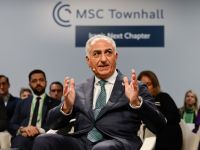Saudi kite-flying on production rise stirs up reaction
DUBAI, July 5 (AFP) - Saudi Arabia stirred political reaction in the Gulf after warning it would hike output to bring down oil prices, but analysts on Wednesday maintained it was merely kite-flying.
"The Saudi statement was a test of public opinion to sound out the reactions of other OPEC countries and the effect it would have on the oil market," said Fadhel al-Jalabi, director of the London-based Centre for Global Energy Studies (CGES).
Saudi's Oil Minister Ali al-Nuaimi warned Monday that if prices did not fall, the kingdom, in concert with the other producer countries, would increase production by 500,000 barrels per day (bpd) "very soon".
"This is a message to OPEC to say that the cartel's last production increase agreed upon in Vienna was not enough," Jalabi told the Qatar-based Al-Jazira satellite television channel.
Nuaimi, whose country is the world's largest oil producer nation, has certainly been overwhelmed by reactions, most of which were not positive.
He has seemingly been busy on the hotline since Monday trying to appease panicky fellow regional producers that Saudi Arabia would not act unilaterally and damage the cartel's unity.
Nuaimi on Tuesday contacted both his Kuwaiti and Iranian counterparts to assure them that Saudi Arabia would not take any decision to increase its production without consulting OPEC members and acting within the framework of a cartel accord.
On Wednesday Qatar's Energy Minister Abdallah bin Hamad al-Attiya said he had received the same message from Nuaimi.
One oil expert speaking under the cover of anonymity told AFP that "although under US pressure, Saudi Arabia would not increase its production in a unilateral way."
"It is, after all, Saudi Arabia that led the last two campaigns to increase the cartel's production to boost oil prices to reasonable levels," he said, adding that the Saudi statement had been "misinterpreted and badly exaggerated".
But an official Iraqi newspaper on Wednesday kept up Baghdad's criticism of Saudi Arabia, accusing it of looking to hurt the interests of OPEC members.
"The Saudi decision is an example of irresponsible behaviour aimed at hurting the interests of the member countries of OPEC," charged Babel, run by the eldest son of Iraqi President Saddam Hussein, Uday.
"The Saudi decision would cost OPEC countries enormous losses of not less than five billion dollars a month if the prices were lowered to 25 dollars a barrel," Babel said.
An Iraqi oil ministry official on Tuesday described al-Nuaimi's statement as a "US plot" and urged OPEC member states to stop bowing to pressure to lower prices from the United States -- the world's largest oil consumer.
The UAE reaction was markedly different, with Abu Dhabi saying it would go along with a future OPEC decision to raise output again to keep oil prices down after consultations with oil ministers from the OPEC member states.
The Organisation of Petroleum Exporting Countries (OPEC) decided in June to hike production from July 1 by a modest 708,000 barrels a day -- compared with the one million extra barrels the United States was believed to want.
In the face of the smaller output increase, prices had stubbornly held well above 30 dollars a barrel in London and New York until Nuaimi's statement on Monday.
Achieving a larger output increase at the June OPEC meeting was complicated by the fact that most of the 11 cartel members are producing close to capacity and would not benefit from a decision to pump more oil.
Apart from Saudi Arabia, the only OPEC members with significant spare capacity are believed to be Kuwait and the United Arab Emirates.
The price of crude continued its steep decline Wednesday, falling below 29 dollars a barrel in midday trade in London.
The day before, Brent fell 1.52 dollars a barrel to 29.58, while the New York market was closed for the Independence Day holiday.
ht/lp/mb
© 2000 Mena Report (www.menareport.com)







